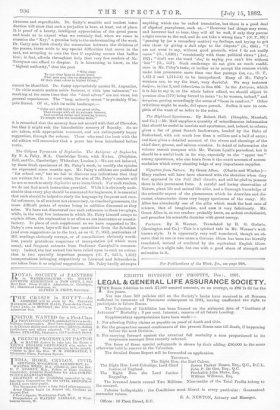The (Edipus Tyrannus of Sophocles. The Antigone of Sophocles. By
F. A. Paley, M.A. Cambridge Texts, with Notes. (Deigliton, Bell, and Co., Cambridge ; Whittaker, London.)—We are not induced, by those fresh specimens of Mr. Paley's work, to modify the opinion we expressed some months ago. Mr. Paley's editions are published " for school use," but we fail to discover any indications that they are written for it. In most cases, the aim of Mr. Paley's readers will be not so much to study Sophocles as to learn Greek. For such readers, we do not find much instruction provided. While it is obviously unde- sirable that every play should be annotated for beginners, it is essential that such should be helped to study the language by frequent and care- ful reference, in all matters not elementary, to standard grammars, the more difficult points of syntax being in addition discussed as they arise. We have not discovered one such reference in these two plays, while, in the very few instances in which Mr. Paley himself essays to explain idiom, the explanation is as often as not inaccurate or unsatis- factory. In place of such supplement as we have suggested to Mr. Paley's own notes, boys will find hero quotations from the Scholiast (and even suggestions as to the text, as on CE. T., 90G), particulars of MS. readings obviously corrupt, or of emendations obviously worth- less, purely gratuitous suspicions of interpolation (of which more anon), and frequent extracts from Professor Campbell's commen- tary. Indeed, the last named has been relied upon to such an extent, that in two specially important passages (CE. T., 623-5, 1,262) interpretations belonging respectively to Linwood and Schneidewin are taken from it as original suggestions. Mr. Paley hardly attempts anything which can ho called translation, but there is a good deal of slipshod paraphrase, such as,—" However bad things may seem, and however bad to bear, they will all be well, if only they pursue aright course to the end, and do not take a wrong turn " 7'., 89) ; "passing by (as a secondary matter) my feelings, and trying to get over them by giving a dull edge to the dispute" 688) ; "I am not wont to say, without goad grounds, what I do not really
mean" 1,620); "consistently with these political views" (Ant., 192); "don't use the word she,' in saying you can't live without ' her'" (ib., 567). Such renderings do not give us much confid- ence in Mr. Paley's taste, or incline us to accept the reasons which make him pronounce more than one fine passage (as, e.g., (E. T., 1,451.2 and 1,511-14) to be interpolated. Many of Mr. Paley's versions are, to say the least, very doubtful. We may instance BociCere, in line 2, and iv&vreiVeat in line 205. In the Antigone, which it is fair to say is, on the whole better edited, we should object to yundtcas Erma (579) being forced to mean "to be women, indeed," and levEinivas getting accordingly the sense of "loose in conduct." Other criticisms might be made, did space permit. Suffice it now to com- plain of the want of an index to the notes.


































 Previous page
Previous page